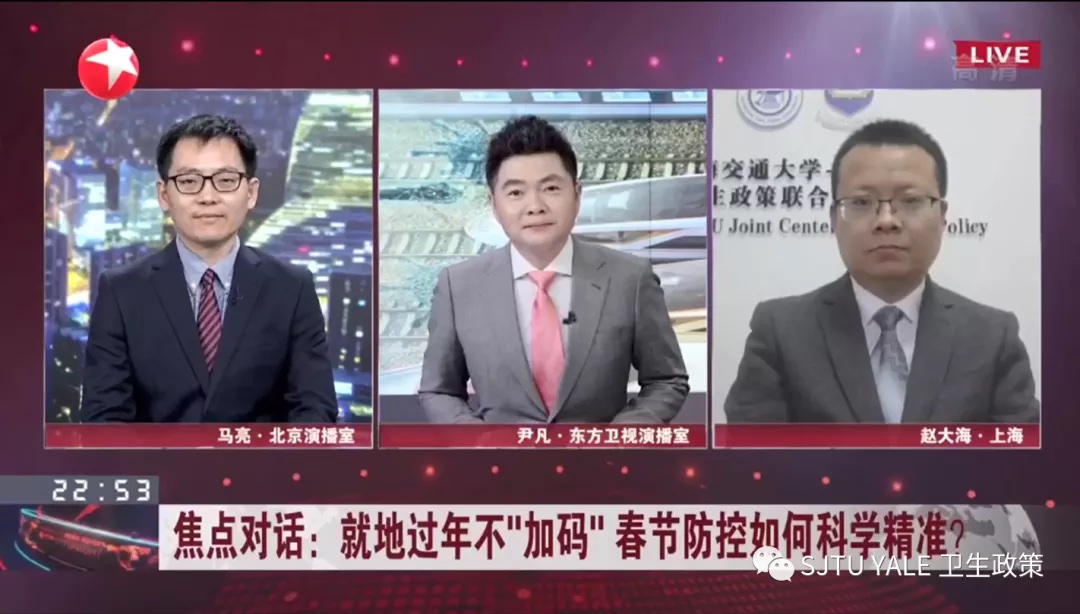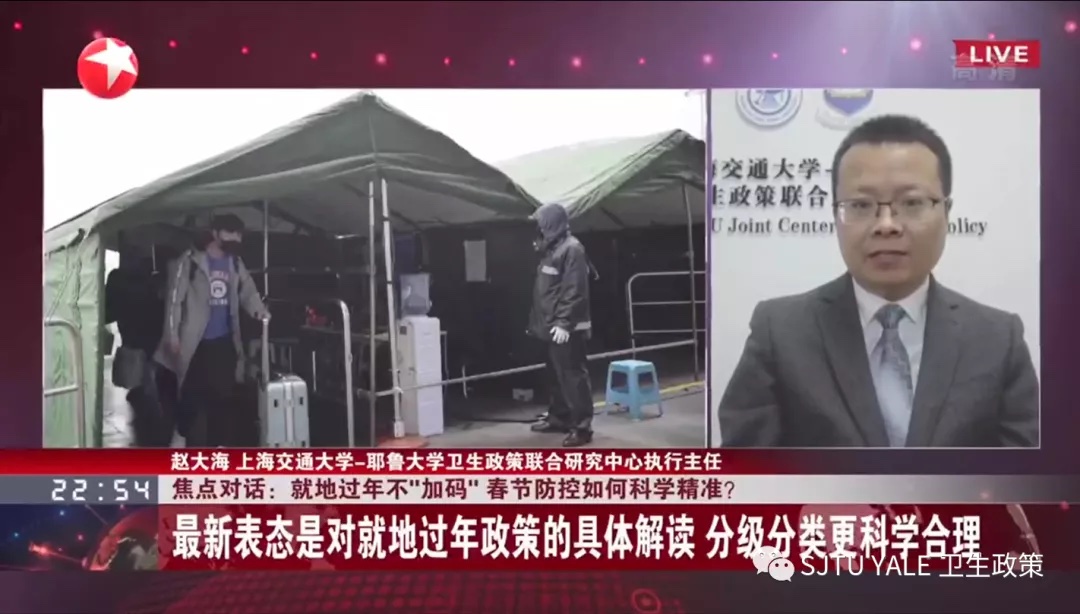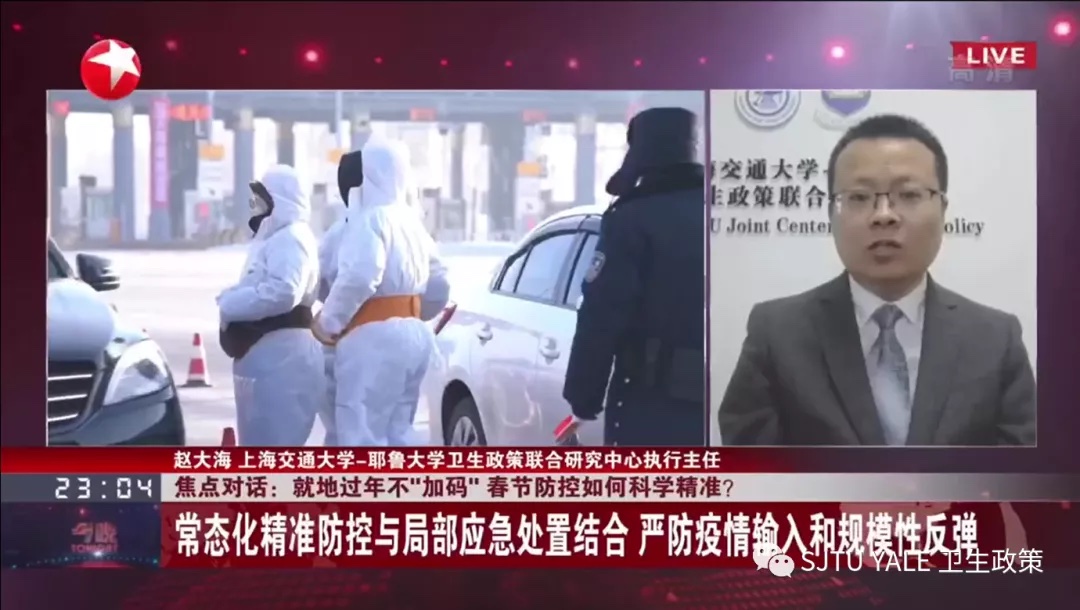上海交大赵大海接受东方卫视专访:科学遵守“就地过年”对我国新冠疫情防控至关重要

上海交通大学国际与公共事务学院教授、博士生导师,上海交通大学-耶鲁大学卫生政策联合研究中心执行主任赵大海,自新冠肺炎疫情暴发以来,对于新冠疫情暴发、防控以及卫生政策第31次接受上海电视台专访,也是第81次接受央视、上视专访。2021年1月27日,赵大海接受东方卫视《今晚》节目专访,就当日国务院联防联控机制新闻发布会《关于做好人民群众就地过年服务保障工作的通知》的“就地过年”新政策进行了直播访谈。同期北京演播室嘉宾是中国人民大学公共管理学院马亮教授,现仅将有关赵大海的访谈内容摘录如下。

主持人尹凡:今天我们邀请到的是上海交通大学-耶鲁大学卫生政策联合研究中心的执行主任赵大海。首先请教赵先生,如何正确理解国家有关部委关于“就地过年”政策分级分策的表态,对于老百姓最关心的就是,到底还能不能回家过年?
赵大海:对于现在的这个政策,我们应该科学地理解。中央相关的对于高中低三类新冠疫情风险地区“就地过年”相关政策,是对前期关于“就地过年”政策的具体解读,应该讲是更加合理、更加科学了。与此同时,即便是对于低风险地区,中央也依然是倡导群众“就地过年”,非必要不出行。此外,对于返乡人员必须要持有近七日的核酸检测阴性的证明,依然是硬性的要求。因此,我认为中央对“就地过年”的最新表态,首先不会加剧春节期间人员的流动,也不会对防控带来更大的压力。对于广大群众而言,我们依然还是要自觉地“就地过年”。

主持人尹凡:鼓励大家就地过年,部分流动人口比较多的省份可能会因此面临相对较大的防控压力。春节期间,在让大家有一定的新春文娱活动的同时,应从哪些方面着手做好防控,避免出现疫情反弹?
赵大海:春节期间,我们应当继续按照“外防输入、内防反弹”的原则,继续实行常态化精准防控和局部应急处置相结合,按照“人物同防、减少人员流动、减少人群聚集”的要求,抓好节假日应急准备和应急值守,严防疫情输入和规模性反弹。具体包括:尽量规避人员的过大聚集;严格控制公共场所接待规模;抓好医院、商场、超市、集贸市场等重点场所的疫情管控;以及强化疫情监测预警和应急处置等。只要我们做到了上述精准防控和应急处置的预案管理,我们一定能做到春节期间不发生疫情的反弹。
供稿者:上海交通大学
日期:2021年1月28日
Dahai ZHAO’s Exclusive Interview with ShanghaiTV: Scientific compliance with "celebrating Spring Festival at current residing localities" is of vital importance to COVID-19 containing in China
Dahai Zhao, a doctoral supervisor at the School of International and Public Affairs of Shanghai Jiao Tong University and Executive Director of Shanghai Jiao Tong University-Yale University Joint Research Center for Health Policy, has been interviewed by ShanghaiTV for the 31st time (the 81st time by CGTN / ShanghaiTV) since the COVID-19 pandemic. On January 27, 2021, Zhao commented on the "Notice on the work of serving and ensuring people who stay at their current residing localities to prevent spreading the epidemic during Spring Festival" by the press conference of the State Council joint prevention and control mechanism and a new policy on "stay at their current residing localities" on “Tonight” of Shanghai TV. Another guest is Professor MA Liang from the School of Public Administration at Renmin University in Beijing.
Yin Fan (The anchor): Today we are joined by Zhao Dahai, executive director of SJTU-Yale Joint Center for Health Policy. First of all, I would like to ask Mr. Zhao how to correctly understand the statement made by relevant ministries and commissions of the state on the policy of "Staying at the current residing localities". For the common people, what they are most concerned about is whether they can still go home for Spring Festival.
ZHAO: We should have a scientific understanding of the present policy. The relevant policies of the central government on "celebrating the New Year at the current residing localities" for the high, middle, and low-risk areas are specific interpretations of the previous policies on "celebrating the New Year at the current residing localities", which should be said to be more reasonable and more scientific. At the same time, even for low-risk areas, the central government is still advocating that people "celebrating Spring Festival at the current residing localities". Don't travel unless necessary. In addition, for returning person, they must hold nucleic acid test negative proof within seven days, which is still a rigid requirement. Therefore, I don't think the central government's latest statement on the "celebrating Spring Festival at the current residing localities" will increase the migration flow during the Spring Festival, nor put more pressure on prevention and control. For the broad masses, we still have to consciously "celebrate the New Year at the current residing localities”.
Yin Fan: Some provinces with large numbers of floating people may face relatively great pressure to prevent and control during the Spring Festival. In order to let everyone have a certain New Year's recreational activities as well, what should we do to prevent and control the epidemic and avoid a rebound?
ZHAO: During the Spring Festival, we should follow the "Outside defense input, inside defense rebound" principle, continue to practice the normalized precision control in combination with local emergency disposal in accordance with the "people and things together, reduce personnel flow, reduce crowd gathering" requirements, emergency preparedness, paying special attention to the disease input and rebound. Specifically, trying to avoid excessive gathering, strictly controlling the reception scale in public places, concerning key places of hospitals, shopping malls, supermarkets, markets, et.al., and strengthening surveillance, early warning, and emergency response. As long as we have achieved the above accurate prevention and control and emergency response plan management, we will be able to avoid a rebound of the epidemic during the Spring Festival.
Contributor: SIPA, SJTU
Data: January 28, 2021

